
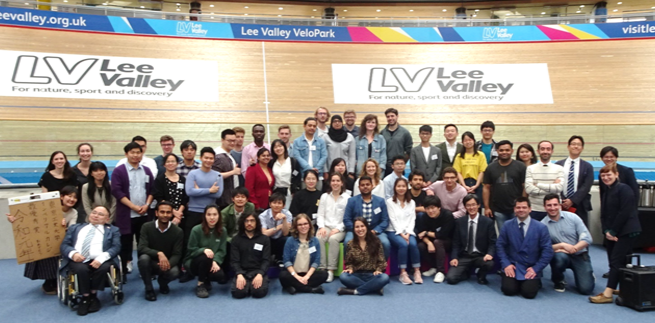
| The GFP fulfilled many of my personal goals in the ongoing pursuit of my career objectives. Initially, I became a Doctor student because I believe that scientific research has the power to make a real difference in society by making people's lives better. A lot of the topics of my research are centred around climate change issues, and this was exactly the theme tackled by GFP this year: Climate Action. The topic is what originally called my attention, but other skills I still needed to gain as a professional (e.g. communication, collaboration, team building, leadership skills) were also positive points I thought I would gain in applying to this programme. Luckily for me, the programme surpassed my expectations. The schedule was designed so that us, students, could first get acquainted with our teams, build team spirit and team trust, and then gather information as a team on current climate action topics by listening to researchers of the field and by visiting environmentally sustainable project spaces in London. In the end of the program, our expertise were put to test as we were challenged to come up with an innovative project to contribute to climate action. It was refreshing to be able to work with PhD candidates from several fields and cultural backgrounds. The experience was certainly very enriching for me and I was impressed with all the groups' ideas and with the food for thought they generated. GFP was a week of reflection and learning. But, most of all, it was a week where we exchanged ideas, personal insights, research information, and many other thoughts with fellow PhD students and Professors from the Imperial College and Tokyo Tech. Networking is fundamental in the academic environment and can lead to fruitful collaboration in the future. Hopefully, some of the ideas pitched during the Programme will come to life soon enough. I feel privileged to have been part of this project and will carry with me the lessons I learned and the friends I made for a very long time. |
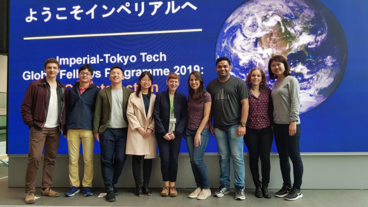 |
 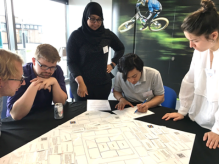 |
The Imperial-Tokyo Tech Global Fellows Programme 2019 built a platform for doctoral students from Tokyo Tech and Imperial College London engage in interdisciplinary collaborative work to find solutions to a global issue. Via the program, 20 from each institution work together for five days, designing solutions to achieve one of the United Nation's 17 Sustainable Development Goals, "Climate Action." The whole program is well designed and closely focus on the theme "Climate Action" from the beginning to the end. The Program lasts for 5 days, which combined multiple activities which aim at understanding climate change on a global scale, inspiring innovation ideas to this global environmental trends and improve the teamwork skills as well. Although individuals are more or less aware of climate change and its impact,this program provides a good platform to understand this issue on a global scale and its inner relationships which had an impact on every aspect of our life via having all the expertise from different research fields involved and multinational and cross-cultural group cooperation. Additional, I strongly felt that you could achieve more with interdisciplinary cooperation. Everyone may have an absolute advantage in specialization, but it shows a limitation on solving global issues. That is why we need to share more, communicate more and support each other by teamwork, it does work more effective in finding the feasible solutions and inspiring innovative ideas. Furthermore, via GFP 2019, I felt the way we communicate is more important than communicating itself, especially when we come from different nations with various research backgrounds. We should adjust our role in the team according to the situations to better facility the whole group achieves the final goal through effective communication within the limited time. Addition to all I gained from the program, I also felt the doctoral students from Imperial College London have a strong confidence when they are expressing personal opinions and eager to change the world by themselves. They are so proud to be a researcher and hold a positive attitude to what they are researching for. Maybe we should do the same. |
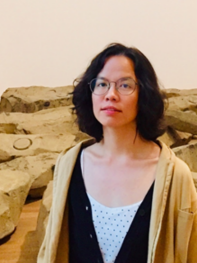 |
In June 2019, I have a fantastic week in London spending time with the Ph.D. students from Tokyo Tech and Imperial College. It was a refreshing and unique experience away from my routine and busy research preparing for graduation. I applied to the workshop initially to understand the background behind the movement of Climate Action since it is also related to my doctoral thesis of climate simulation for building passive solar design. I was prepared to get in touch with international researchers from others discipline to get inspired for my work but exceed my expectation, the workshop has open a new horizon for me both on the knowledge and understanding interdisciplinary research. The program begins with ice-breaking activities to get to know other participants from different schools and different research field. Then the teams move on through various part of the program to create bonds between team members before concentrate to propose a solution to tackle Climate Action. There are lectures on research network and the challenge facing climate change, also teamwork activities to practice cooperation and common language to facilitate communication and visit around London sustainable building. I feel lucky to team up with other students from Tokyo Tech and Imperial College. We have a great team who understand each other with a lot of respect and cooperation despite the barrier of language, and none of us share common ground on the research field. Through the program, we learn others things related to the topics when it is required a researcher concern about research ethics, idea communication, community engagement, and active listening. Our proposal at the end was not directly a solution for climatechange but an adaptation to response and provide protection for humans during disaster resulting from climate change, which for us an alternative of Climate Action alongside with our team interest. Although we didn't win we are surely satisfied with our time together and most of all, the bonus we gain is friendship and collaboration interdisciplinary research. Last but not least, this program is one of a kind experience proposed for Ph.D. students, and I would like to recommend it to any others students because you will always learn new things when you are with new people, in a new environment and carrying an open mind to adapt and accept the change. |
| This was the best opportunity for me to interact with international students and researchers from both Tokyo Tech and Imperial College London who havetotally different cultures and educational experiences. During the program, we divided to 5 teams. For each team had 4 students from Tokyo Tech and 4 students from Imperial College London with different research backgrounds. We worked on finding a final solution to solve the climate change. Even the theme this year, Climate action, was related to my research area, but I had learnt many new things from joining the program. In this fellow program, I learned how to cooperate with my team mates who have a totally different study field. At first, I was struggling with the language barrier but it was getting better after we tried our best to communicate each other. In the end, our proposed idea won the 1st place with everyone's involving. In addition, I had learnt to do good teamwork, expanded my viewpoint and networking throughout groupworks and team challenges, and also exchanged in cultures and knowledge globally. I personally would like to keep in touch with my friends gained from this program for a long term and recommend to other Tokyo Tech students to join this program in next year. |
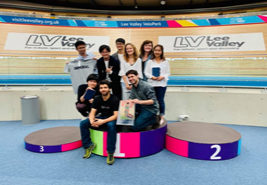 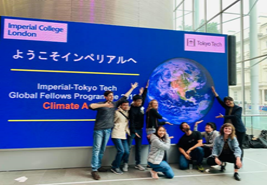 |
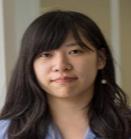 |
This programme was not only a class of liberal arts but also valuable experience in my school life. There are many activities of group works to communicate teammates. (Unfortunately) all my group members are from different countries so we have to use English for communication.This experience was very hard and good training for me because there are only Japanese in my lab and we don't use English on a daily basis. I learn an attractive and easy-to-understand way of speaking. Lectures and campus tours were helped to know new views. My teammates from Imperial were friendly, active and good at praising. They stuck to winning. Because of their passion, we got Winning Team Award on the final presentations! I learned importance of maintaining motivation. The good news is that some members from Imperial will come to Tokyo Tech for their research. They introduced London, so I am glad to have chance for presentation of Tokyo with them and to keep in touch them for long time. Through this programme, I had opportunities to meet other students in Tokyo Tech who are in other campus and other school years. I will never forget the wonderful experience with nice friends. |
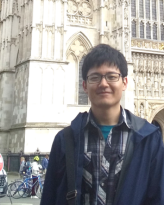 |
It was a wonderful week with Imperial and Tokyo Tech doctoral students in UK. In the programme, I learned and experienced the essence of collaboration and good teamwork with people who had different background: culture, institutions and research fields. It was very interesting that my team members had different ways of thinking: how they approached and/or analyzed a problem, even all of them were in science and engineering fields. Some considered a model with a function generating outcomes from some inputs to explain and solve a problem, and others tried to connect keywords and sentences to get solutions like cooking. I thought it was really important to confirm each other's ideas and thinking by asking.Because of different background, misunderstanding sometimes occurs during teamwork. To work well as a team, it is necessary to understand and share ideas in the same way. I think that asking questions and/or explanations of understandings is good way to prevent misunderstandings. In the programme, there were many activities and time to develop team working skills and communication skills not only in a project of climate action but in team challenges: kinds ofgames, and networking/free time after day activities. At the time, I talked with others about culture difference and research topics in a doctoral program. It was really fun and helpful to open my heart. After these networking, I felt much easier to talk to team members even in a heated discussion. From this experience, I learned that it was easy and effective for good teamwork to have some activities or free time for networking before working on a problem/project. To open heart, don't be shy, is a key of good collaboration and that is one of the most important thing what I learned. |
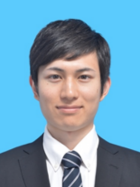 |
In June 2019 I had the opportunity to participate in Imperial-Tokyo Tech Global Fellows Programme with theme "Climate Action". The programme was a 5-day camp in which doctral students from both Imperial Colledge London and Toyko Tech involved in interdisciplinary research to tackle climate action. The aim of the programme is to foster interdisciplinary collaboration among students from different disciplines. I discussed with my teammates about climate action and I also heard the opinion of the expert. Thanks to my teammates, my team was awarded for the final presentation. I also met so nice friends there. It was well worth the participation in this programme. Thank you. |
| I applied to this programme because I thought it would be possible to create global network and to exchange knowledge of each other in this programme. In this programme, we made 8 student group and discussed solution for climate change. To be honest, this programme was really good opportunity and helpful for me because I obtained many friends, new knowledge and experiences. Among them, I would like to show three things that I learned in particular below. First was importance of English communication. I knew that this is one of the really common problem for many Japanese but I could feel it again through this programme. The group discussion was required to consider the solution in short period of time and it was really pressure for us. So, it was necessary to talk briefly the main pointsand to have the other person understand my opinions continuously. It was hard even for me who is relatively used to communicate in English. Therefore, I should improve my English communication skill, especially, skill to persuade others in English. Second was importance of group management. I truly reflected that we honestly could derive better solution for climate change if we could manage discussion in our group. We did not have a roll of manager such as facilitator who organize the group and guide toward the final result. In fact, when students from different backgrounds such as nationality and expertise as in this case, various points such as values, purpose, and humanity are largely different, and often the discussions do not fit together. Therefore, I think that I had to control the discussion well by setting up a facilitator who can manage the organization fluently. In the future, I will try to improve my language skills and become a facilitator. The third is to have confidence. Honestly, the most regrettable part of this group work is that I could not push my own opinion. In group work, I contributed to this group work as the idea man for discovering the solution to the problems. On the other hand, I was unable to make a claim on my own idea. The reasons were the communication skills in English shown in 1 and 2 and the divergence of discussion. The point was I'm kind of embarrassed and gave up trying to keep my opinion through to the end. It was full of regrets if I think that the final result was different if I kept my own opinions. Talk about what I think, regardless of language or group situation honestly. This seems really easy but very hard. In the future, I would like to acquire a wide knowledge in addition to language skills so that I can make an opinion without being shy. Finally, it was a very good opportunity to learn a lot more than the above three points. Although I am a doctoral student who has trouble closing in the laboratory, I think that it is possible to check about own superiority and inferiority through this programme. In addition, I can say that this would be valuable for own future. I strongly recommend that you participate this programm. |
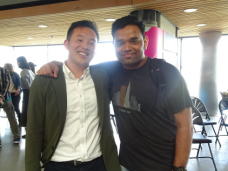 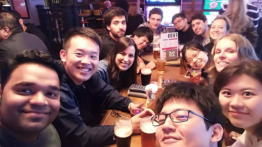 |
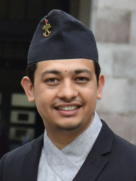 |
During the Global Fellows Program in London, I shared my room with another participant from Tokyo Tech, Mr. Tomo. We became really good friend and shared many stories about our research, lab, life in Japan and impression about London. I must say everything went very well. We met more 20 PhD students from Imperial College London and divided into 5 groups of 8 student (4 each from both universities). We named our group The Deciders-Inspired from Takehiro Inohara Sensei, Our Team Coach. The program was filled with interesting games of collaboration, team building, mind games, creativity, research ethics and brainstorming project idea with keywords-Developed by Hironao Kaneko Sensei. The first three days were mostly about collaboration and brainstorming ideas for climate action. We attended very diverse and in-depth presentations from 5 experts on the first day linking their works in solving climate problems. In addition, the tour to the siemens crystal building and white city campus was also a great experience to learn about undergoing projects, researches and community collaborations in climate action. The day before the final- Idea Pitch was one of the important parts of the program. All groups pitched their idea and got hit by many questions in order to bring the best project in the finals. Finally, after the program me and my roommate came back to the hotel. We had a talk about the program and concluded that collaboration within the group members was the most important thing to pitch the best idea. We all were experts from our own field and when we worked together each member's expertise and idea was valuable for successful project. And that what we learned and experienced from this program. 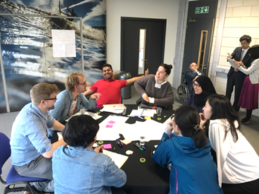 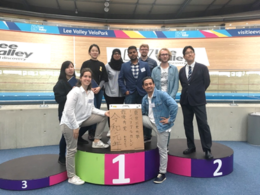 |
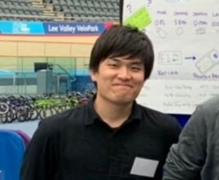 |
In June 2019, I could get the opportunity to participate in Imperial-Tokyo Tech Global Fellows Programme 2019. This year's theme was "Climate Action". This programme consisted of 5 days, and there were 20 participants from Tokyo Institute of Technology including me and 20 from Imperial College London. We were divided into 5 teams, and then each team tackled "Climate Action" through games, discussion, and presentation. This was one of the best experiences of discussing with international Ph.D. students and professors who have a different aspect of education and culture. I have strongly experienced that every Imperial College London student has high-quality discussion skills in English. They can express their opinion logically and show evidence precisely. So, I had my hands just full of following their conversation. I fully re-realized that I must hone my communication ability in English and Japanese. In the end, I would like to tell appreciation to all professors, teachers, staffs, and students who cooperated with this programme. I will convert the experience that I felt in the programme into the power to tackle my research problem. Additionally, I'm going to expand my friends the greatness of the study abroad programme. |
| My experience of the five-day intensive workshop kicked off with a smooth cohesion with the other seven group members coming from Japan, China, the Netherlands,and the UK, all from diverse backgrounds. One of my personal favorites was the trip to the South Kensington Campus as strolling around the university felt like a trip down memory lane of the area after seeing many historic buildings made of red bricks, intricate design and elaborate architecture. Last quarter, I was a TA for a Sustainable Development course under my supervisor, Professor Yamaguchi, and in the class, we talked a lot about the Sustainable Development Goals, in which one of the most confronting issues that is deterrent in achieving the 17 goals is Climate Change. The presentation by Dr. Joanna who works for the Intergovernmental Panel for Climate Change was especially amusing to me as I have been involved with research on climate change since my undergraduate years.Her personal anecdotes about the hardships and the pressing tasks in delivering accurate and reliable results in order to contribute for the publishing of the IPCC's Assessment Reports were very pleasing to me particularly because I also aspire to work for the United Nation's specialized agencies in the future. As I do another TA work this quarter for another course, Case Method for International Development, the practical things I learned about research collaboration and collaborative work, in general, will definitely come handy for me in imparting the knowledge and skills I gained through this program. |
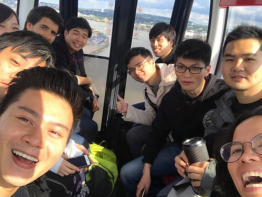 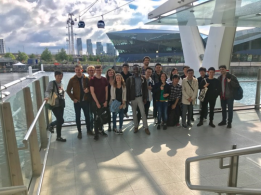 |
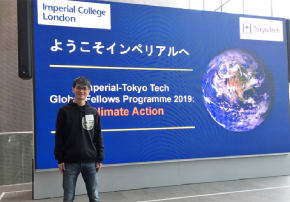 |
That was an amazing and memorable trip for Imperial - Tokyo Tech Global Fellows Programme 2019. Total 40 doctoral students with different background from Imperial College London and Tokyo Tech met at the London Olympic Park, and spent a 5-days professional camp around the theme of Climate action. I was deeply attracted by the theme, "Climate Action", which had a strong relationship with my research. I used to think that this programme was just a-week trip at London or a series lectures, so I could only receive some professional knowledge on climate action. In fact, the outcome was much beyond my expectation. It should be the most challenging and impressive project I have ever participated in. During the 5-days activities, in my group, 8 members from 7 countries with totally different background worked together on the theme of climate action. From the initial language barriers that limited communication, to the final co-completion for the presentation. At the brainstorming, we should keep thinking, keep listeningand keep talking. We first proposed our project individually based on our disciplines and then promoted it to other members. What impressed me most was that each proposal received enough respect. We discussed each proposal and voted, then discussed and voted, selected finally one.This process was very interesting for people with different background, people come from Asia prefer to make a statement in turn, while European prefer to speak freely. In the final presentation, more opportunities were given to members who spoke less. Because of the flash proposal and excellent team work, our team received the approval from judge team. Whether the communication and collaborative skills or the relationship received from this programme, it will be of great help to my future career development. |
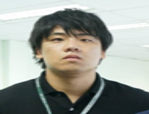 |
In June 2019, I got an opportunity to join Imperial-Tokyo Tech Global Fellows Programme, which was held in London, UK. Since this was the very first time to join international program in my doctoral course, I was overly excited to have interaction with the student from Imperial college London, who have different nationality and research field. In first day of the programme, luckily, I found that our team has a wide variety in terms of both nationality (Japanese, British, Filipino, Chinese, Vietnamese, Iranian) and research field (Computer science, biology, mobile communication, evaluation of disaster risk, etc.). On that day, we had several activities to get know each other with excellent help from both Imperial college (Thank you very much for prof. Paul!) and Tokyo tech. After that, we had several lectures from researcher to deepen the understating of climate change, which is the main topic of this programme. Since each lecture had less than 10 students, I felt that it was more like a discussion with the specialist rather than a usual lecture. Also, it was really interactive and totally different from 'lecture' that we imagine. In last two days, we had an intense discussion within our team since we were going to have a presentation with competition style on last day. Since this program includes ice-breaking activity, lecture, group work and presentation, I could learn possible problem we may have in intercultural environment and how to solve it. I am so sure that this program will meet your expectation, or even beyond! ...and if you worry about your language (English) ability, don't worry, everything will be okay anyway!!! |
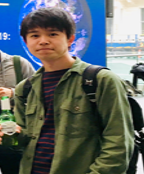 |
In June, 2019, I had the opportunity to participate in Imperial- Tokyo Tech Global Fellow Programme. The camp with doctoral students from Imperial Collage of London and Tokyo Tech for 1 week was unforgettable memories for me. I participated in the study abroad like this programme for the first time. I was worried about group work using English communication due to my poor English skill, but I could enjoy talking and discussing with other students by their support. I'm grateful to them. All things/events through 1 week made me grow up. Students of various countries participate not only in England, I could get a lot of inspiration and knowledge of various cultures from all participants for my research activity. Though this programme, I learned a lot of important things such as active participation, understanding of member and contribution to group. The programme gave me the opportunity to change myself. If you worry about study abroad or would like to change yourself, I recommend to join this programme. You would giveinvaluable experience through the programme. |
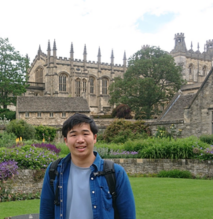 |
In March 2019, After I decided to join the programme, I looked for a laboratory which I visit. When I looked for the laboratory, I placed importance on the research field related to my research partially. Because, I would like to extend my knowledge and discuss deeply with Imperial students and staffs. Therefore, I chose a laboratory at the departmentof bioengineering (Supervisor: Dr. Au Sam). While I stayed at the laboratory, I had spent precious time and got a lot of experience in research and culture. I had discussed my work with my supervisor once a week. At the first discussion, we decided what to do while I stayed at the laboratory. From the next discussion, he asked me about what I did last week and give me advice about not only research but also philosophy. Almost every day, I had observed the experiment and communicated with Imperial student about research and culture. At first, it was difficult to communicate well with Imperial staff and students. However, I had tried to talk to a lot of people in English. As a result, I could communicate well gradually. Through this experience, I can imagine that I work oversea as a researcher and recognized my improvement point. I strongly recommend joining this programmme, because I felt a different culture and got new insights from the programme. Finally, I am grateful to the staff at the International Student Exchange Division, teachers at the Institute for Liberal Arts, my supervisor at Imperial and Tokyo Tech foundation for helping and accepting me. |
 |
I was fortunate enough to be a part of Imperial-TokyoTech Global Fellow Program (GFP). It elevated me to acquire a more in-depth understanding of the theme "Climate Action." The program took place in Velodrome, London under the enthralling direction of Dr. Paul Seldon. I greatly appreciate the collective efforts of Tokyo Institute of Technology and Imperial College London in convening 40 international researchers from both the universities who shared a similar interest in this theme under a big umbrella. The entire program ran for a week focusing on personality development, team building, brainstorming activities, workshops, followed by a research project with an objective to propose creative solutions on the "Climate Action". This program hugely motivated me to develop collaborative research ideas with scholars from different parts of the world across various disciplines. Climate Change is becoming a top threat to every nation which needs an urgent attention. There is no country which is not experiencing extreme changes in climate. There is a need for thorough education, awareness, scientific advancement, and innovative solutions to check the climate action. During this course, I learned to think out of the box other than my research area. I started linking my expertise with an interdisciplinary approach to bring the wholesome project, which offer a sustainable environment and help in controlling the emission of greenhouse gases. During this process, I learned to involve myself in a team and contribute as an active team member rather than an individual. I understood the importance of a multidisciplinary approach in resolving the severe challenge of "Climate Change." Besides these technical experiences, I found significant improvement in my adaptability with multinational people from a different cultural and traditional background. I recognized my potential in problem-solving, and critical observations in various brainstorming activities. I also enhanced technical conflict resolution and leadership skills during this program. In a nutshell, this program was one of the best experiences I had after joining the Tokyo Institute of Technology, and I wish many students make use of such opportunities to advance their career. Last but not the least, I like to thank Tokyo-tech and all associated members for this opportunity and making the event a grand success. Further three weeks of a research visit in Prof. Robert Ewers laboratory (forest ecology lab) at Silwoodpark campus of Imperial College London gave me an exposure in coastal ecology. Iam a coastal engineer working on the conservation and rehabilitation of Mangroves using coastal structures. My current research requires an in-depth understanding of coastal ecology to bring out quality interdisciplinary research. I had fruitful discussions with fellow lab members and professors of forest ecology lab and came across some key understandings related to mangrove ecology. 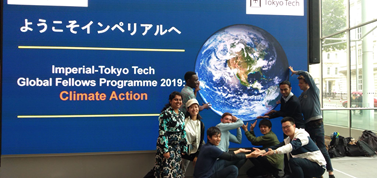 |
| In the Global Fellows Program, I had 5days of workshop and three weeks of research visit. In the workshop, 4 students from Imperial College London and 4 students from Tokyo Tech made one team, and the goal was to give a poster presentation about a solution to "Climate Action" problem, which is one of the UN's 17 sustainable development goals. We learned current situation around climate change, team building skills and unique ways which have already done to tackle with climate change through various lectures, games, discussions, and field trips. What I found the most impressive in the workshop is how we can create a good team where every member of the team respects each other, listens carefully and collaborate effectively. We have different backgrounds and various expertise. In addition, my team did not have a native English speaker. Under that circumstance, we set our team rules including a bit funny rules - such as "Don't be shy" "Move together" which were working more as catch phrases - and always made sure that we followed the rules. That worked very well. The catch phrases (team rules) contributed to uniting us, and reminded us of the most important things for the team when we were upset or felt pressured in our discussion. That is a tip for team building I learned in the GFP and I keep it in my mind. Fortunately, I got the opportunity to join in the 3-week research placement at Imperial. I worked with Professor Clive Potter in the Center for Environmental Policy at Imperial. During the 3 weeks, I studied about the current situation and policy background of local food production in London, compared to Tokyo. I analysed the policies of the Greater London Authority and the policies of the subordinate municipalities (a city or boroughs) which were related to local food production in London. I also met and discussed with the environmental project manager from the Royal Borough of Kensington and Chelsea and the project director of Sustain, the UK's leading charity organization on food and agriculture. It was very limited time to do research, but it was great experience for my career. It is great that we have beautiful friendship with the imperial students and other students from Tokyo Tech. Not only we chatted and had good time together in pubs, but also we discussed research themes that each of us was dealing with and got insights from different perspectives. |
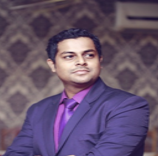 |
In June 2019, I got an opportunity to participate in the Imperial- Tokyo Tech Global fellowship program. It was a weeklong climate action themed program. It was truly an international event with nearly 40 students from different countries and background. It was a wonderful opportunity to develop our research and professional skill in an international environment. In the first phase of the program, the students were divided into groups with assigned team challenges. It was a great platform to develop the skill of effective teamwork where the team comprises member from different background, culture, and nationality. In the next phase of the program, teams were assigned to find a sustainable solution for current issues in climate action. After the brainstorming stage, we came up with many ideas. Interestingly, most of the ideas were related to the respective research field of the team members. However, we realize that none of the projects can be accomplished without collaborative work. Therefore, for me, the engraving fact was that to obtain a sustainable solution of a global problem, experts from the different field need to work together since mostof the global problems are interdisciplinary. Following the global fellowship program, participants had an opportunity for research placement at the imperial college of London. It was indeed an excellent opportunity to identify new edges in my research field. My host supervisor for the research placement was Dr. Christian Malaga Chuquitaype, who taught me a different aspect of dynamic analysis of deteriorated reinforced concrete (RC) buildings. The title of my project was "Non-linear time history analysis of deteriorated RC buildings." From this research project, I was able to make a bridge between the structural performances of deteriorated structures at the member level with the global behavior of deteriorated RC structures. Finally, I would like to say that the opportunity of research placement in the Imperial College of London not only improves my research skill but also construct a platform where the prospect future research collaboration is open. |
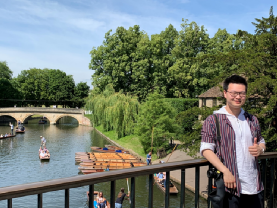 |
I was happy that all of us got opportunities to express ourselves in this super international programme. Although we were from different backgrounds, we focused on climate action and related problems such as food, disasters, diseases and environment, for a whole week. At last, each group presented a unique and memorable solution/strategy to respond to recent climate actions and mitigate their effects. Honestly, I couldn’t believe that we can make such a difference in a short period. Thus, my mind went blank when we made it eventually. Fortunately, I experienced 3-weeks research visiting after the GFP workshop. Imperial College London and London left me a good impression. Imperial has massive research resources and a comfortable atmosphere, which provided me a place to calm down and keep studying. Besides, there are more than 170 museums in London, including some of the world's finest. The British Museum, Natural History Museum and V&A museum, all of these places are my best choice to spend weekends. My career plan is to solve practical problems through interdisciplinary views, which asks for a multicultural and multilingual workplace. Thanks to this programme, I started realizing my role in a team and found an efficient way to work in an international workplace. I have got a memorable experience at Imperial College London, UK. Many thanks for that. |
| This year's theme was climate change. We received a lecture from an expert and went to a tour before thinking about a solution. It was a lot of fun to think about ideas with students in different fields. A lot of knowledge is required to generate ideas, but it can be solved by sharing information and helping each other. Also, after the workshop there will be a three weeks research visit. The three weeks were short, but I was able to understand the atmosphere of the laboratory and how to proceed with the research. Inaddition, it is very valuable to exchange information and become friends with overseas students. It may be possible to do collaborative research. It was a very good experience for me. May you be so! |